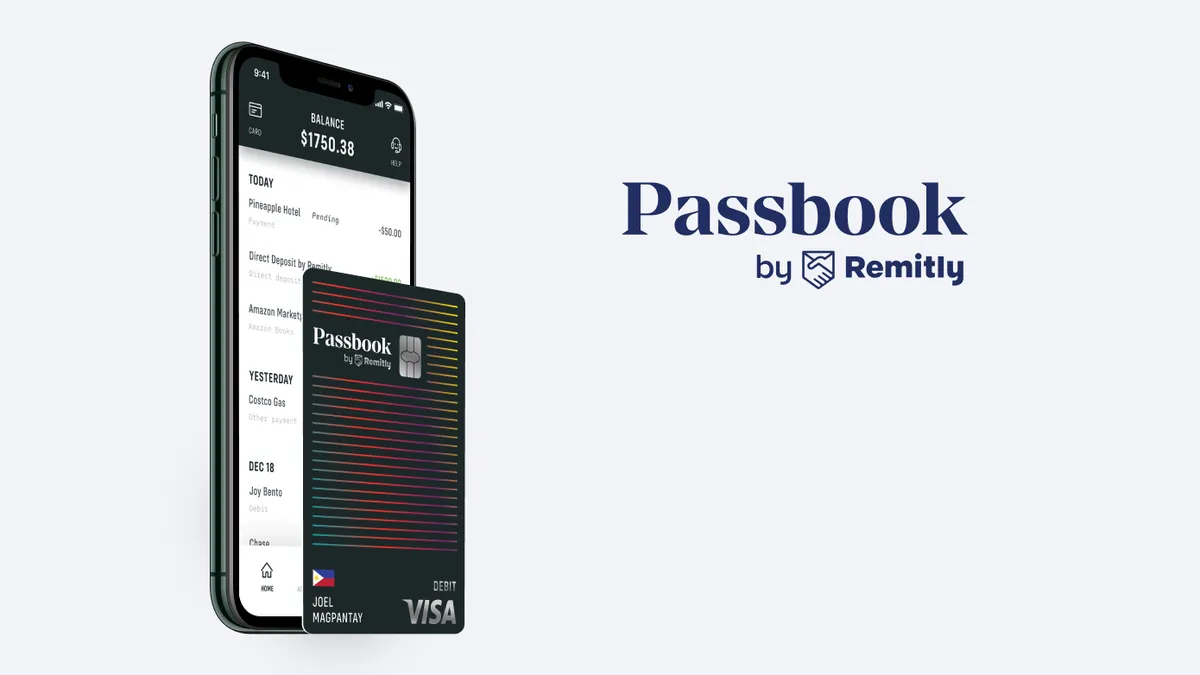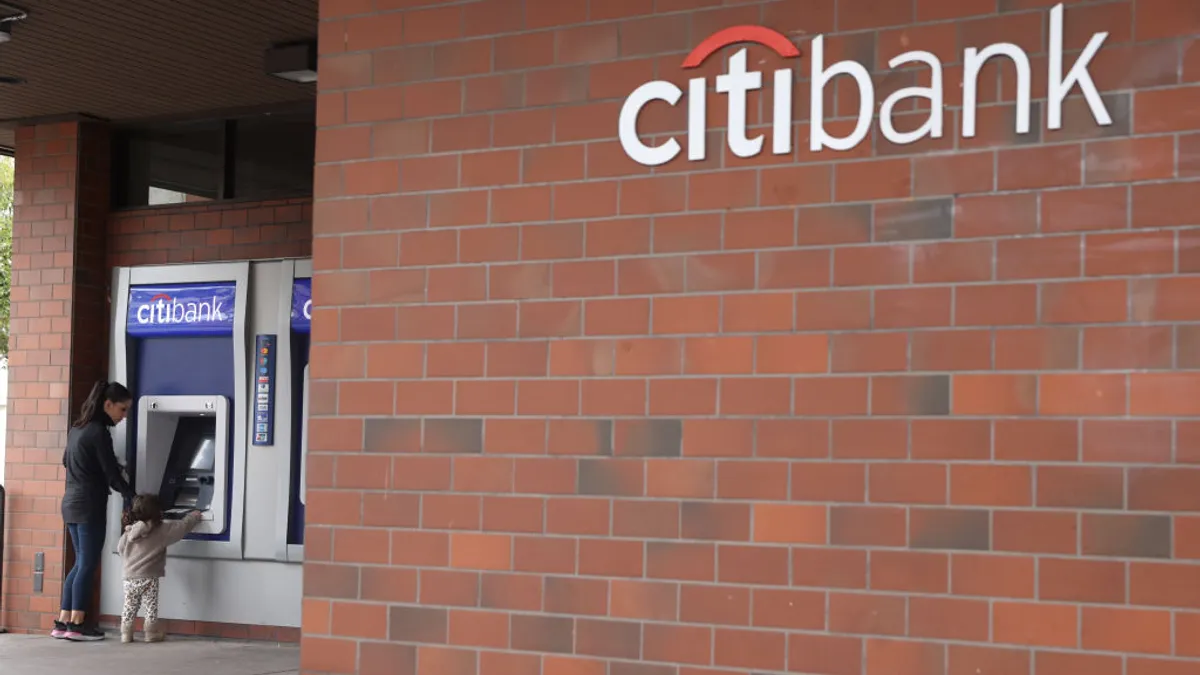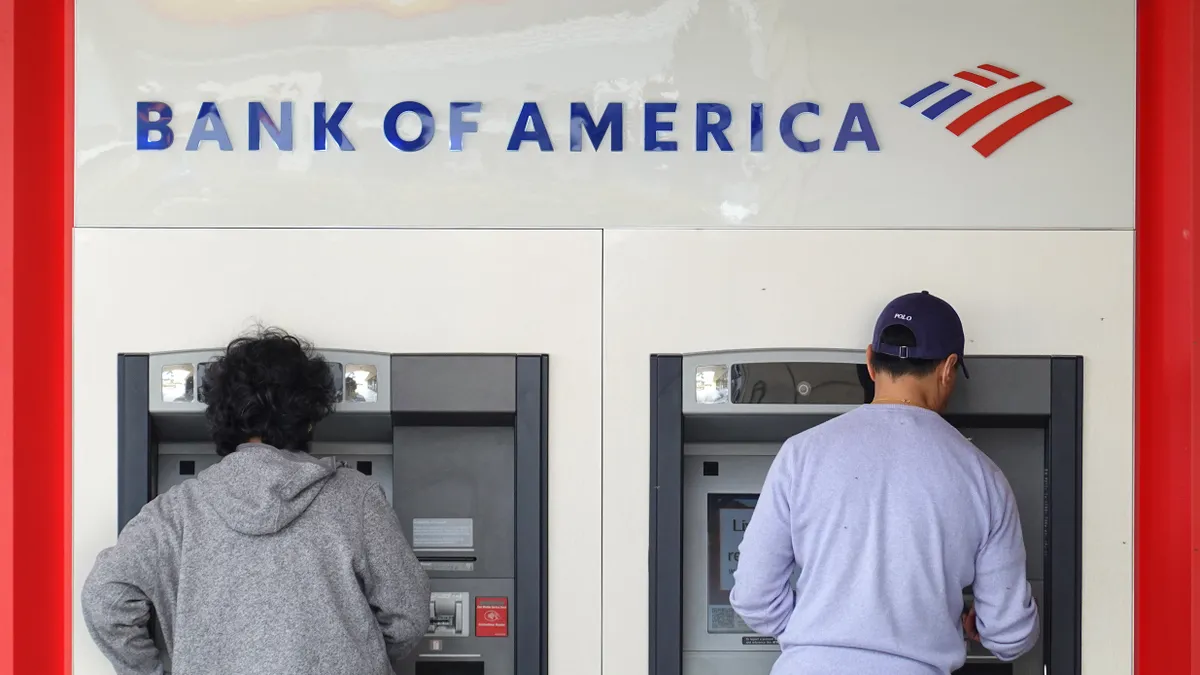Seattle-based startup Remitly announced it was expanding its services beyond remittances last month with the launch of Passbook, a digital bank account for immigrants.
Remitly, which already targets the immigrant community with its money-transfer services, says Passbook will make banking more accessible and affordable for that same demographic.
"Our mission is really to improve the lives of immigrants around the globe by transforming the financial services that they have access to," Matt Oppenheimer, Remitly’s co-founder and CEO, told Banking Dive.
Oppenheimer said Passbook, which is FDIC-insured through a partnership with St. Paul, Minnesota-based Sunrise Banks, is a free bank account that makes money off of the interchange fees when customers swipe its Visa-branded debit card.
Passbook has no monthly fee and customers can use a variety of forms of ID to create an account, whether they are issued in the U.S. or not.
Customers receive a $2 discount for every remittance they send via their Passbook account, a perk Oppenheimer says will encourage existing Remitly customers to utilize the new banking service.
Remitly declined to share how many customers have opened accounts with Passbook since its launch last month, but the company says over 2 million customers use its money transfer service.
"We have a track record in the communities we serve where we built a really trusted financial services brand," Oppenheimer said. "And that's where this product started. Customers came to us and said, ‘I trust you with remittances, can you offer other banking services?"
Oppenheimer spoke to Banking Dive about the importance of establishing trust with consumers, solving pain points in the immigrant banking market and the trends he’s seeing in the fintech space.
This interview has been edited for clarity and brevity.
BANKING DIVE: What gave you the idea to start the company?
MATT OPPENHEIMER: I started the business when living in Kenya. I was running mobile and internet banking initiatives for Barclays Bank Kenya and saw personally how hard it was to send money internationally. But while that was painful for me, it was more painful for a lot of my Kenyan friends and a lot of folks that I've interacted with over the years who have remittances that they use for their daily needs and basic necessities.
There are two kinds of segments of remittances and we're focused on the latter segments of folks who send low average transaction sizes, often picked up in cash. And it's really a lifeline and super important to their lives and that's why myself and I think a lot of the team get up every day to serve customers that make a huge sacrifice to leave their family and then make a huge impact on their families back home.
Majority has also recently launched a banking account aimed at immigrants. Can we expect to see more financial products that target this demographic hit the market?
OPPENHEIMER: I think Majority is a good example and I have a lot of respect for them. I think similar to neobanks like Chime, Monzo, N26 and Revolut, they're just starting their journey to transform banking services. If you look at them, the percentage of the overall banking market, they're going to be tiny.
I think that you're going to have some banks that focus on specific segments, like immigrants for us or Majority. And I think we're just starting to see that adoption curve and so you're just starting to see some products like ours and theirs in the market. But we're in the first inning of transforming financial services for people broadly, and then for the customers we serve specifically, immigrants.
Is there enough room in the market for multiple offerings targeting specific demographics?
OPPENHEIMER: I think so. There are 250 million immigrants that live and work outside the country they're born. I think that it's a very large market, it's often underserved and underappreciated. I think just like you see a lot of neobanks coming out from the mass market, you'll see a few that will be successful really helping reinvent banking for immigrants that have very specific pain points when it comes to financial services.
Why do you think Remitly customers will choose to open accounts with Passbook?
OPPENHEMEIMER: When I started this business nine years ago, I used to think that you offer a cheaper fee, you offer faster transfers, those things matter, but they pale in comparison with the fact that trust is very hard to build — for any customer, to be fair — but especially for the immigrant customer who makes $30,000 a year, and who sends a few hundred dollars of their hard earned money home with a nameless, faceless, digital provider. That is really scary.
And I think similarly, it's true for depository checking accounts. Because, unlike lending, where the financial services institution is giving out money, with deposits or remittances, we're asking customers to give us their money and the information that we need for compliance and fraud protection. That's really scary for customers.
We built this product with security in mind and we have a track record there. We have trust with over 2 million customers. Our customers care about this because, if you ask any immigrant if financial services meet their needs broadly in the country they moved to the answer is, no.
Do you have plans to add a lending product?
OPPENHEIMER: We could over time. Lending is a big component of the financial services needs that our customers have. We're really focused right now on building out Passbook as a great product, but certainly over time we can think about other financial services.
Does Remitly have any interest in pursuing its own banking charter, like digital bank Varo Money is doing?
OPPENHEIMER: There are some segments of financial services where you have to go and immediately get the direct licensing, and remittances is one of those. So from day one, compliance has been absolutely key to what we do. I think that's one of the reasons we've been able to build such a great banking product now, because our compliance infrastructure processes and systems are so strong, that impacts customer experience as well as our reputation within the industry.
But when you look at banking ... Getting a banking charter is not for the faint of heart. And there are a lot of banks out there that partner with fintechs specifically to be able to offer a banking product and so we went the partnership route there to launch. I think that there are pluses minuses with that approach, but most have gone with a partnership route with the exception of Varo Money.
What trends do you expect to see in the digital banking space?
OPPENHEIMER: Neobanks will continue to have a much more customer-centric user experience and lower cost because they're not dealing with legacy infrastructure and cost. I think it all comes down to how companies build trust and have such a differentiated product that there's that virality and word of mouth. I think you've seen that in some of the mass market banks like Monzo in the U.K. The virality of people having Monzo cards — when you talk to people they just can't wait to pull it out and show it to people.
I think there's going to be several large banks built in the space that give the traditional banks a run for their money. Banks aren't institutions that have incredibly high [net promoter] scores and brand affinity and loyalty, so I think it's a space ripe for disruption. But it's really complex. Scale will matter and trust will matter.























